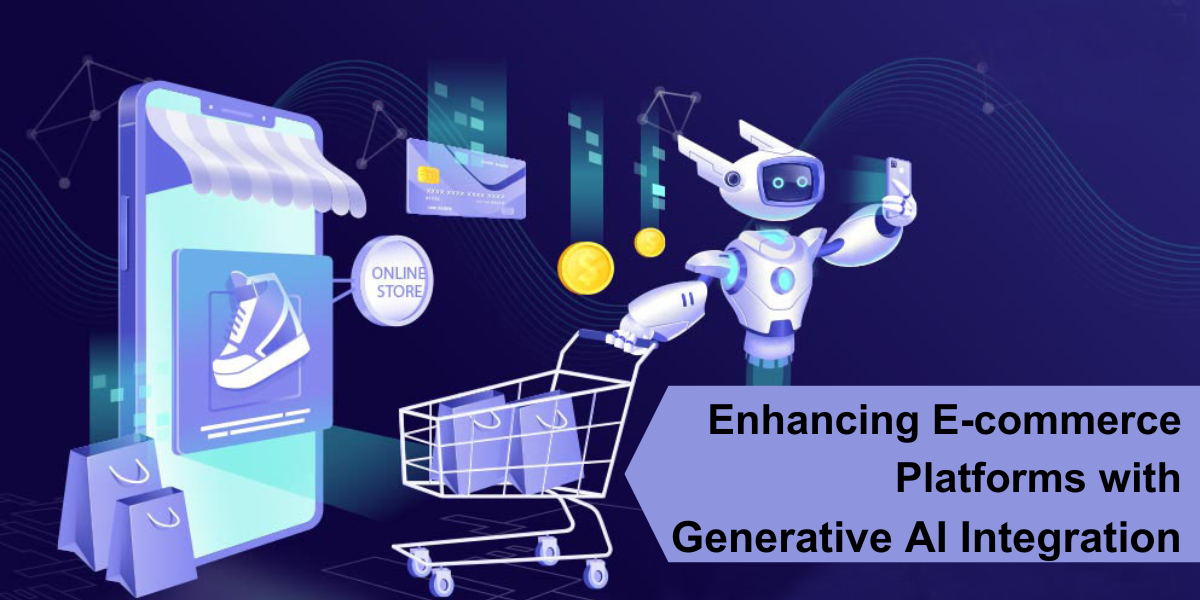Artificial Intelligence is being integrated into everyday routine. Generative AI integration can create content in a matter of minutes. Predictive AI has an in-depth look at the future. Deep learning can produce human-like characters. ChatGPT is an established brand. Big data is the latest “thing” now. It also expands into eCommerce and AI, providing new possibilities for understanding customers, engaging with them, and automatizing crucial processes. The estimates indicated that the global investment in AI for e-commerce is predicted to exceed $8 billion by 2024.
Generative AI In E-Commerce has been slowly altering the world of e-commerce for a couple of years. Proactive e-commerce businesses like Amazon are integrating technology to enhance and improve customer experience online and mobile apps. They benefit from increasing their conversion rates and sales in the process. Many other brands in the e-commerce industry are beginning to get their feet wet with the possibility of AI-related features, but momentum is increasing.
Whatever your website is in the process of AI enhancement, you’re likely always searching for additional information, which could affect how you conduct your business. This article will provide the essential benefits and capabilities of generative AI that are available in eCommerce.
Understanding Generative AI
Before exploring how generative AI can improve the efficiency of e-commerce in sales and operations, it’s essential to understand the idea of generative AI in itself. Generative AI is artificial intelligence that employs machine learning algorithms that generate fresh data or pictures. The versatile AI software is helpful across various activities, including writing, music composition, and art.
Regarding online shopping, Generative AI plays various roles, including generating customized product suggestions, creating distinctive product descriptions, and even creating customized videos for clients. Generative AI, thanks to the capability to tailor and develop, is set to transform the world of e-commerce, improving customer satisfaction and boosting sales in ways that were previously unimaginable.
What Exactly Is AI in eCommerce?
AI in eCommerce involves the insertion of AI-related technologies in the online marketplace and its operational processes. The use of algorithms and data-driven insight to increase user satisfaction improves business processes, improves sales, and completes various other important eCommerce tasks. In the deeper analysis, particular branches of artificial intelligence are crucial in adjusting various aspects of eCommerce.
The Importance Of AI In The World Of E-commerce
If we talk about artificial intelligence (AI), a few ideas may come to your mind: powerful autonomous robots, self-driving automobiles, and intelligent personal assistants such as Alexa and Siri. At its heart, AI is concerned with machines or systems that mimic human brains. This includes the process of learning (acquiring data and making rules for making use of it), reasoning (using the rules to come up with precise conclusions), and self-correction.
In light of the digital boom and the changing consumer buying habits, companies are using AI to adapt to market shifts efficiently and maintain an edge. AI can be integrated into the e-commerce business by assisting retailers in automating processes, providing customized customer experience, and making informed decisions. AI allows online companies to recommend items to consumers in various elements, such as their prior purchases or search history.
Additionally, AI chatbots for e-commerce and automated customer service have been advancing stride-for-stride by interacting with humans. This allows companies to offer cutting-edge customer service with the most petite hands. If a customer faces an issue or question, the AI-based system can help reduce time and effort, leading to more satisfied customers.
Generative AI In E-Commerce Use Cases
The growing popularization of e-commerce could be due not just to its simplicity and ease but also to the personalized experience available across various platforms based on the preferences and tastes of each customer. Marketers study the traits that make them popular with customers across sectors. Some aspects of customer loyalty and the growth of online commerce and retail include personalization of product options, recommendations, search results, promotional shipping, and other delivery options. With this information, online sellers can identify processes that require generative artificial intelligence (AI) techniques that could yield significant investment returns.
Companies are using Generative AI in Retail, manufacturing, and other sectors to boost efficiency, increase sales, and personalize customer experiences within the online retail space. It’s been demonstrated to be an essential game changer. Below are some instances where generative AI can be utilized by companies that sell online for their advantage.
Provide Product Suggestions In A Manner That Your Customers Like
Customers are delighted at how personalized shopping makes their experience after they’ve had the pleasure of experiencing it. Generative AI provides online retailers with many options to recommend products or services to consumers in a way that is based on previous purchase, their browsing patterns such as wishlist items, top-searched products, and various other data details. This can range from the personalized recommendations of products to tailored discount offers and deals.
These AI-powered applications analyze customer details and previous purchase histories and hand data sources for suggestions pertinent to the customer and compatible with needs and preferences. In other words, give them items that they will be more inclined to search for or design discounts based on the overall value of your shopping cart.
Organize Marketing Efforts That Are Specific To Each Customer
An all-encompassing marketing approach could attract clients to your website or physical stores. But today’s times have evolved, and so too do consumer demands. Most consumers want to avoid being targets of general marketing campaigns that promote products and services consumers never want or even require.
If you cannot offer the customized experience that customers require, today’s customers are fearless in examining your competitors as they realize the value of their expertise. Create marketing strategies that are targeted. Based on demographic and behavioral information, you could group your customers into different groups and tailor your marketing campaign based on the specific interests of each group. It is possible to guarantee results and a positive return for your marketing campaigns in this way.
Boost Supply Chain And Inventory Control
In good faith, debates regarding modernizing the supply chain and inventory control continue. In the aftermath of the epidemic, dead products have flooded storage racks and supply networks are plagued by problems arising from geographic restrictions. Due to delayed deliveries, most companies need help finding the perfect equilibrium between demand and supply. Generative AI used in eCommerce has the potential to improve transparency and tracking across many different supply chain tech stacks.
Use AI’s Conversational Skills To Respond To Customer Inquiries
While chatbots seem old-fashioned, chatbots and generative AI can improve customer care and support. Along with the benefits of not requiring the same workforce and the availability of a support person at all hours of the day, Chatbots have risen from decision trees averaging 15-20 to unlimitless ones. Merchants can experiment using different conversational techniques to meet the needs of their customers and personalize each communication to increase engagement and answer questions by displaying human-like emotions and empathy to create a human-to-human experience using advanced generative models. If all these components are in sync, customers can enjoy a better chat experience, boosting shopping carts’ efficiency and revenue.
Increase The Number Of Chances For Upselling And Cross-Selling
You’ve likely heard of Artificial Intelligence’s capabilities in chatbots and product recommendations, offering customers personalized content according to their personal preferences, past experiences, and preferences. The information may be used to create intelligent buying experiences and take photos, words, or any other form of media. Shortly, artificial intelligence in online retail stores will be able to analyze all these datasets and advise the best next step customers can follow in their buying experience. Increase profits and ROI, resulting in more opportunities for cross-selling and upselling.
Creating Transaction Flows With Auto-Fill For Every Client
The majority of websites today are based on an established structure. This is that, regardless of users’ preferences or choices, they show identical images, data, and banners to every one of them. Retailers can offer each customer a personalized experience according to their preferences due to the generative AI used in eCommerce. It means that every customer can browse a customized site with products that automatically fill in according to the information about the customer stored in the backend. Additionally, based on the consumer’s behavior and demographics, that would result in an extremely high degree of customization.
Stop Phishing And Fraudulent Activity
The event that hackers or scammers get access to your business online often leads to fake returns or purchases, lowers profits, and reduces confidence among consumers. By recognizing unidentified users and those with a suspect history and generating AI algorithms for online retail, you can detect and stop these fraudulent and illegal actions and block these individuals from accessing your business online. As time passes, this will result in savings on costs and profits for business.
Consistent Product Descriptions To Enhance SEO Rankings
An online store is an internet-based storehouse of endless products that require several sessions to find some products that will appeal to customers. It is here that concise yet practical product descriptions are helpful. Previous strategies included asking writers to review descriptions, create appealing new versions, and incorporate SEO keywords. This strategy worked well, but sellers could only upload descriptions of products. This cost the seller the business money as well as a valued client.
That’s why, even before the advent of generative AI was developed for eCommerce, retailers utilized A/B tests to find the most convincing descriptions for their products. In addition, developments in generative AI technology permit the creation of standard descriptions for retailers and vendors. The writers can now provide the generative AI technology with clear directions to write product descriptions that align with your company’s tone and are grammatically written.
Optimized Images Of Products For Luxury Purchases
Photographs of products are a crucial part of PDP websites, with every photo requiring a considerable staff of models, photographers, and editors. And other creatives to shoot. It is one of the areas where generative AI could help businesses build custom product sites by utilizing textual inputs and old picture data. Adobe Firefly, Adobe’s most recent innovation in dynamic AI models, allows artists to convey their thoughts more efficiently and freely. All you need to do is communicate the image you want to turn your imaginative idea into real. It is now possible to make realistic photos based on the subject matter, the type, the setting, and the color you choose to identify.
Using generative AI in e-commerce images can allow businesses to create images in real-time. In the case of apparel, for example, a firm can make photographs of individuals of all sizes wearing their items to appeal to similar customers. If users can provide more details about the AI models that generate AI models, their queries will get more specific to the specific context in which they live.
To Increase Sales, Track And Improve Product Pricing
The consensus is that buyers research and compare the prices of equivalent goods online and in stores before purchasing. If their preferred items are sold at an affordable price, they do not mind looking. Internet sellers need to be aware of the price-sensitive nature and remain flexible in their pricing strategy throughout the day.
You can monitor price fluctuations caused by your competitors, analyze the patterns of demand and pricing, and further enhance the pricing of your products using intelligent AI algorithms that prevent clients from moving to competitors.
How Can We Implement Generative AI Solutions For Ecommerce?
Implementing generative AI solutions for e-commerce will improve various aspects of your business, such as personalized customer experiences and supply chain efficiency. Below is a step-by-step guide on how to apply the use of generative AI for e-commerce.
Set Out The Goals And Cases For Use
Define your goals for implementing generative AI for e-commerce. Find areas where generative AI could benefit, such as product recommendations, content production, and supply chain optimization.
Preparation And Collection Of Data
Collect relevant data to train the Artificial Intelligence (AI) model. AI model. It could include customer behavior data, product information, and sales history information. Ensure the data is clean, normalized, and ready for training.
Pick The Appropriate Generative AI Model
Pick the dynamic AI model that will work for your particular needs. These could include models like GPT (Generative pre-trained transformer) or VAE (Variational Autoencoder). Be aware of factors such as the model’s complexity, training duration, and resources for remodeling. The selected algorithmic AI model is based on the created database. This could take a lot of computational resources. Modify the model according to the specific requirements of e-commerce and the expected outcomes.
Integrate Into E-commerce Systems
Incorporate the newly trained artificial intelligence AI model into your existing E-commerce platforms. It could require working with APIs or customized Generative AI Integration. Be sure to ensure compatibility with your technology stack as well as platforms.
Review And Assess
Continuously evaluate the performance of the generative AI model. AI model. Evaluate its effect on crucial performance indicators, such as the rate of conversion, satisfaction with customers, and revenue. Change the method or approach according to the feedback received and changes in the business demands.
Make Sure That Data Is Secure And In Comply With The Following
Ensure data security and compliance with rules, especially when working with your customer’s data. Use the appropriate measures to guard the security of sensitive data.
Scale And Repeat The Process
After the intelligent AI solution has been implemented, Consider gradually scaling it to include more elements of e-commerce. Continuously improve the algorithm based on fresh information and evolving business needs.
Future Outlook Of Generative AI In E-Commerce
The future for Generative AI in e-commerce is full of promise and is set to change the face of e-commerce. Companies will likely see more tailored and immersive customer experiences as AI algorithms improve.
AI-Powered Voice Assistants
The widespread use of smart home appliances has prompted the development of voice assistants for shopping. Generative AI will drive the advancement of better voice assistants capable of recognizing and catering to each customer’s requirements with personalized suggestions.
Hyper-Personalized Marketing
Generative AI’s ability to analyze data allows the development of highly personalized marketing strategies. This involves tailoring every aspect of marketing, which includes creating ads and messages according to the behavior and habits of the individual consumers.
Enhanced Supply Chain Management
Generative AI is a promising technology for increasing supply chain management efficiency by precisely forecasting demand and maximizing stock levels. Also discovering potential issues within the supply chain.
Automated Customer Service
Chatbots powered by AI and driven by Generative AI can take care of customer inquiries effortlessly, providing instant answers at all hours of the day. It not only improves customer service but lowers the operational cost significantly.
New Product Development
Generative AI could assist in creating new products based on market and customer preference patterns. Accelerating the timeframe for product development and reducing the possibility that products fail.
Fraud Detection
By leveraging its pattern recognition capabilities, Generative AI improves the security of platforms by quickly identifying and stopping fraudulent transactions immediately. It also protects both the business and its customers.
Final Thoughts
AI is advancing, but it still needs to mature. Businesses that use AI technology now could get rewarded for having an advantage. However, they should be cognizant of the potential roadblocks. Generative AI Integration Process into e-commerce platforms provides numerous benefits to companies looking to increase sales conversion and enhance user satisfaction.
With the help of advanced algorithms for the creation of content, personalization of chatbots, integrated reviews, product comparisons, as well as cross-selling and upselling personalized bundles along with the development of images and videos, companies can provide an effortless and enjoyable buying experience that connects to the customers on a more personal scale. In addition, by automating ongoing web-related development, companies can ensure their online platforms remain relevant and flexible in a constantly changing digital world.
Being aware of this will prepare you for the future of shopping online in whatever form it is. The advent of artificial intelligence (AI), which is generative AI, such as models like ChatGPT, is a significant change in the e-commerce industry. The ability to personalize customer interaction, enhance product recommendations, improve inventory management, and enhance fraud detection opens up many possibilities for online companies. Since AI technology advances rapidly, it opens exciting opportunities for online businesses to discover and invent.
In the ever-changing dynamics of the retail sector, retailers face a daunting context surrounded by the complexities of changing consumer expectations and a flurry of markets. This is why companies integrate generative AI within their eCommerce platforms.

























